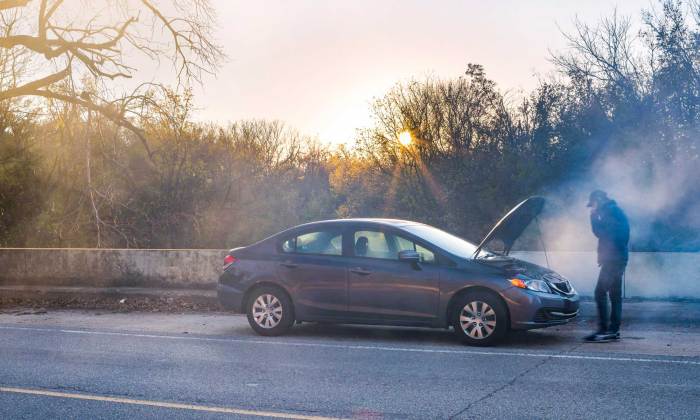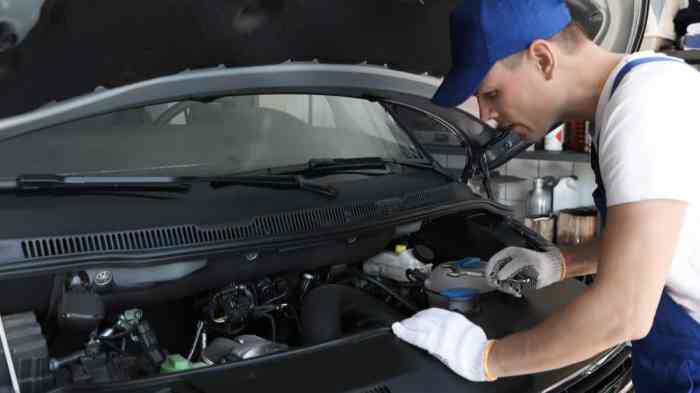What are the most common car problems? This question plagues every car owner at some point. From minor inconveniences to major breakdowns, car problems can be a source of frustration and expense. In this comprehensive guide, we’ll explore the most prevalent car issues, their causes, and symptoms, empowering you to identify and address them effectively.
Whether you’re a seasoned mechanic or a novice driver, understanding common car problems is crucial for maintaining your vehicle’s performance and safety. So, buckle up and let’s dive into the world of car troubleshooting.
Engine Problems

The engine is the heart of your car, and when it’s not running properly, it can cause a lot of problems. Some of the most common engine issues include overheating, knocking, and misfiring.
Overheating
Overheating occurs when the engine gets too hot. This can be caused by a number of factors, including a lack of coolant, a faulty thermostat, or a problem with the cooling system. Symptoms of overheating include a high temperature gauge reading, steam coming from the engine, and a loss of power.
Knocking
Knocking is a sound that occurs when the engine is running. It can be caused by a number of factors, including a lack of oil, a worn-out camshaft, or a problem with the ignition system. Symptoms of knocking include a rattling or tapping sound coming from the engine, a loss of power, and an increase in fuel consumption.
Misfiring
Misfiring occurs when the engine doesn’t fire properly. This can be caused by a number of factors, including a faulty spark plug, a problem with the fuel injector, or a problem with the ignition system. Symptoms of misfiring include a rough idle, a loss of power, and an increase in fuel consumption.
Transmission Issues

Transmission issues are a common problem that can affect vehicles of all makes and models. These issues can range from minor annoyances to major problems that can render your vehicle inoperable.
Some of the most common transmission problems include:
Slipping Gears
Slipping gears is a condition in which the transmission fails to engage properly, causing the vehicle to lose power or jerk forward or backward. This can be caused by a variety of factors, including worn or damaged gears, a faulty clutch, or low transmission fluid.
Grinding Noises
Grinding noises when shifting gears are a sign of a problem with the transmission. This can be caused by worn or damaged gears, a faulty synchronizer, or low transmission fluid.
Difficulty Shifting
Difficulty shifting gears can be caused by a variety of factors, including a faulty clutch, a worn or damaged shift linkage, or low transmission fluid.
Brake Problems

Brakes are a critical component of any vehicle, ensuring the safety of both the occupants and other road users. However, like any mechanical system, brakes can experience various problems that can compromise their effectiveness. In this section, we will discuss some of the most common brake problems, their symptoms, and potential causes.
Worn Brake Pads
Brake pads are the components that come into direct contact with the brake rotors, generating friction to slow down or stop the vehicle. Over time, these pads can wear down due to regular use, especially if the vehicle is driven in stop-and-go traffic or under heavy loads.
Worn brake pads can lead to reduced braking efficiency and increased stopping distances, potentially compromising safety.
Leaking Brake Fluid
Brake fluid is a hydraulic fluid that transmits the force from the brake pedal to the brake calipers, which in turn apply pressure to the brake pads. A leak in the brake fluid system can result in a loss of pressure, leading to reduced braking performance or even complete brake failure.
Common causes of brake fluid leaks include damaged brake lines, faulty brake calipers, or worn seals.
ABS Malfunctions
Anti-lock Braking Systems (ABS) are designed to prevent the wheels from locking up during braking, allowing the driver to maintain control of the vehicle. ABS malfunctions can occur due to faulty sensors, damaged wiring, or a malfunctioning ABS control module.
A malfunctioning ABS can lead to increased stopping distances and reduced vehicle stability during braking.
Electrical Problems

Electrical problems are common in cars and can range from minor annoyances to major safety hazards. The most common electrical problems include battery issues, alternator failures, and faulty wiring.
Battery Issues
A weak or dead battery can prevent your car from starting. Common causes of battery issues include:
- Leaving lights or other electrical components on when the car is turned off
- A faulty alternator
- Corrosion on the battery terminals
Symptoms of a weak or dead battery include:
- Dim headlights
- Slow engine cranking
- Electrical components not working
Alternator Failures
The alternator is responsible for charging the battery and providing power to the car’s electrical system. A faulty alternator can lead to a dead battery, electrical problems, and even engine damage. Common causes of alternator failures include:
- Worn brushes
- Faulty voltage regulator
- Overheating
Symptoms of a faulty alternator include:
- Dim headlights
- Electrical components not working
- Battery warning light on
Faulty Wiring
Faulty wiring can cause a variety of electrical problems, including:
- Electrical shorts
- Fires
- Electrical components not working
Common causes of faulty wiring include:
- Damaged insulation
- Loose connections
- Overheating
Suspension Problems

Suspension problems are a common issue that can affect any vehicle. They can cause a variety of symptoms, from a rough ride to difficulty handling.Suspension problems are often caused by worn or damaged components. Some of the most common causes include:
- Worn shocks or struts
- Broken springs
- Misaligned wheels
Worn shocks or struts can cause a vehicle to bounce or float excessively. They can also make it difficult to control the vehicle, especially on rough roads. Broken springs can cause a vehicle to sag or lean to one side.
This can make it difficult to steer and brake, and it can also increase the risk of a rollover. Misaligned wheels can cause a vehicle to pull to one side or the other. This can make it difficult to drive in a straight line, and it can also lead to premature tire wear.
If you suspect that your vehicle has a suspension problem, it is important to have it inspected by a qualified mechanic. Suspension problems can be dangerous if they are not repaired, so it is important to address them as soon as possible.
Tire Problems

Tires are essential for the safety and performance of your vehicle. They provide traction, absorb shocks, and protect the wheels from damage. However, tires can also experience a variety of problems, including punctures, uneven wear, and low tire pressure.
Puncturesare one of the most common tire problems. They can be caused by sharp objects, such as nails or glass, puncturing the tire tread. Punctures can lead to a slow leak or a sudden loss of air pressure, depending on the size of the puncture.
Uneven wearis another common tire problem. It can be caused by a variety of factors, including improper alignment, worn suspension components, or incorrect tire pressure. Uneven wear can lead to reduced traction and premature tire failure.
Low tire pressureis another common tire problem. It can be caused by a slow leak or a sudden loss of air pressure. Low tire pressure can lead to reduced fuel efficiency, increased wear on the tire tread, and a decreased ability to handle corners.
Exhaust System Problems
The exhaust system is responsible for removing harmful gases from the engine and reducing noise. Common exhaust system problems include:
- Clogged catalytic converters
- Faulty mufflers
- Exhaust leaks
Clogged Catalytic Converters
Catalytic converters convert harmful gases into less harmful ones. They can become clogged due to:
- Using leaded fuel
- Engine misfires
- Excess oil consumption
Symptoms of a clogged catalytic converter include:
- Reduced engine power
- Increased fuel consumption
- Check engine light
Faulty Mufflers
Mufflers reduce the noise produced by the engine. They can become faulty due to:
- Rust
- Holes
- Loose brackets
Symptoms of a faulty muffler include:
- Excessive noise
- Rattling or vibration
- Loss of power
Exhaust Leaks
Exhaust leaks can occur at any point in the exhaust system. They can be caused by:
- Loose connections
- Cracked or broken pipes
- Damaged gaskets
Symptoms of an exhaust leak include:
- Loud noise
- Reduced engine power
- Increased fuel consumption
Cooling System Problems: What Are The Most Common Car Problems?
The cooling system is essential for maintaining a car’s engine at an optimal operating temperature. Common cooling system problems include:
- Coolant leaks: Coolant leaks can occur due to damaged hoses, loose clamps, or a faulty radiator. Symptoms include overheating, low coolant levels, and steam or coolant dripping from the vehicle.
- Radiator issues: A clogged or damaged radiator can restrict coolant flow, leading to overheating. Signs of radiator problems include difficulty maintaining proper coolant temperature, visible damage to the radiator, and coolant leaks.
- Thermostat malfunctions: A faulty thermostat can fail to open or close properly, affecting coolant flow and engine temperature. Symptoms of thermostat issues include overheating, slow engine warm-up, and fluctuating coolant temperature readings.
Regular maintenance and inspections can help prevent cooling system problems. Checking coolant levels, inspecting hoses and belts, and having the cooling system flushed and serviced periodically can extend its lifespan and ensure optimal engine performance.
Fuel System Problems
Fuel system issues can manifest in various ways, ranging from difficulty starting the engine to poor performance and increased emissions. Understanding the common problems associated with the fuel system is crucial for maintaining a vehicle’s optimal operation.
Clogged Fuel Filters
Fuel filters play a vital role in removing impurities from the fuel before it reaches the engine. Over time, these filters can become clogged with dirt, rust, or other particles, restricting fuel flow and potentially causing engine problems. Symptoms of a clogged fuel filter include difficulty starting the engine, rough idling, and reduced power output.
Faulty Fuel Pumps
The fuel pump is responsible for delivering fuel from the fuel tank to the engine. A faulty fuel pump can lead to insufficient fuel delivery, resulting in engine stalling, hesitation during acceleration, and reduced fuel efficiency.
Injector Issues
Fuel injectors are responsible for delivering the precise amount of fuel to the engine’s cylinders. Malfunctioning injectors can cause a range of problems, including engine misfires, rough idling, and increased fuel consumption. Injector issues can be caused by various factors, such as contamination, wear, or electrical problems.
Body and Paint Problems
Body and paint problems are common issues that can affect the appearance and value of a car. These problems can range from minor cosmetic issues, such as dents and scratches, to more serious problems, such as rust and fading.
Dents and scratches are caused by impacts with other objects, such as rocks, branches, or other cars. Rust is caused by the oxidation of metal, and it can occur when the car’s paint is damaged or when the car is exposed to moisture.
Fading is caused by the breakdown of the paint’s pigments, and it can occur when the car is exposed to sunlight or other environmental factors.
Dents and Scratches
- Dents can be caused by a variety of factors, including collisions, hail, and falling objects.
- Scratches can be caused by sharp objects, such as keys, nails, and branches.
- Both dents and scratches can affect the appearance of a car and its value.
Rust
- Rust is caused by the oxidation of metal, and it can occur when the car’s paint is damaged or when the car is exposed to moisture.
- Rust can cause structural damage to a car, and it can also lead to other problems, such as leaks and electrical issues.
- Rust can be prevented by keeping the car’s paint in good condition and by protecting the car from moisture.
Fading
- Fading is caused by the breakdown of the paint’s pigments, and it can occur when the car is exposed to sunlight or other environmental factors.
- Fading can make a car look old and worn, and it can also reduce its value.
- Fading can be prevented by protecting the car from sunlight and other environmental factors.
Interior Problems

Interior problems can be a nuisance, affecting comfort, convenience, and even safety. Worn seats, faulty electronics, and leaks are some of the most common interior issues.
Worn Seats, What are the most common car problems?
Worn seats are a common problem, especially in older vehicles. The upholstery can become torn, faded, or stained, making the seats look unsightly and uncomfortable to sit on. The foam padding can also break down over time, providing less support and causing discomfort during long drives.
Faulty Electronics
Faulty electronics can cause a variety of problems, such as malfunctioning power windows, door locks, and climate control systems. These issues can be frustrating and inconvenient, especially if they occur during extreme weather conditions.
Leaks
Leaks can occur in various places within the vehicle’s interior, such as the roof, doors, or windows. They can be caused by damaged seals, clogged drains, or rust. Leaks can lead to water damage, mold growth, and unpleasant odors.
Ultimate Conclusion
As we’ve explored, the spectrum of car problems is vast, ranging from minor nuisances to major headaches. By recognizing the most common issues and their telltale signs, you can proactively address them, ensuring your car remains a reliable companion on the road.
Remember, regular maintenance, timely repairs, and a keen eye for potential problems can go a long way in extending your vehicle’s lifespan and keeping you safe behind the wheel.
Detailed FAQs
What are the early signs of brake problems?
Squealing or grinding noises, vibrations in the brake pedal, and increased stopping distance can indicate brake problems.
How can I prevent tire problems?
Regular tire rotations, proper inflation, and avoiding overloading your vehicle can help prevent premature tire wear and punctures.
What causes engine overheating?
Low coolant levels, a faulty thermostat, or a clogged radiator can lead to engine overheating.